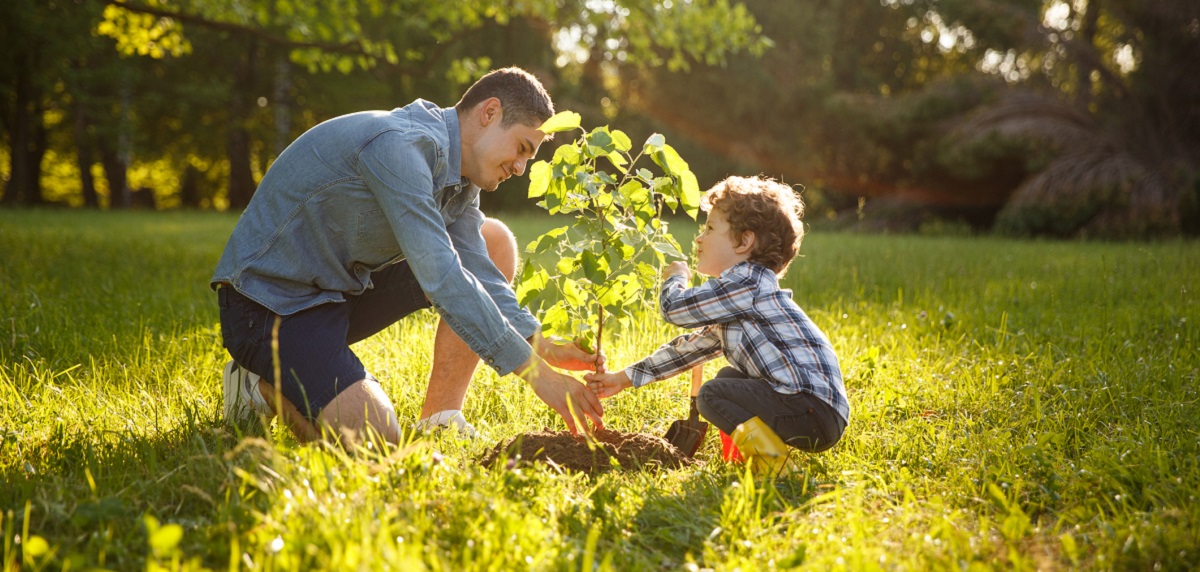Trees are wonderful for the environment. As well as looking beautiful, providing oxygen, and helping save the world by preventing climate change, they also provide life-saving medicines, reduce radiation and noise, and even make us behave better. Planting trees in your own garden can have benefits you never expected.
They’re so beneficial, in fact, that the Woodland Trust is pledging to plant 50 million trees by 2025. They’re urging millions of people to join its ‘big climate fightback’ by planting trees themselves in November.
As part of the initiative, the Trust is sending more than 600,000 free trees to community groups and schools over the next few weeks. They’re also creating an ’emergency tree fund’ worth up to £1 million to support local authorities to plant trees and create woods.
“Trees are nature’s most powerful weapons in the fight against climate change,” stresses Darren Moorcroft, chief executive of the Woodland Trust. “Please do your bit, join our climate change army, plant a tree in November, use your voice for trees and woods.”
The benefits of planting trees
If you need persuading to plant a tree, here are just nine of the many benefits provided by our green friends…
1. Trees combat climate change
Excess carbon dioxide created by man-made activities like burning fossil fuels is building up in the atmosphere, contributing to climate change. This is because carbon dioxide traps thermal energy in the atmosphere in a greenhouse effect, causing global warming.
Trees help reduce carbon dioxide as they absorb and store the gas through photosynthesis, while releasing oxygen back into the air for us to breathe.
2. Trees absorb pollution
The canopies of trees act as a physical filter, trapping dust and absorbing pollutants from the air. A Leeds University study found the world’s forests absorb nearly a third of global fossil fuel emissions.
Environmental campaigners Friends of the Earth stress: “Trees play an incredible role in combating climate chaos by removing planet-wrecking emissions from the air around us.” Yet despite their importance, Friends of the Earth says just 13% of the UK’s total land area has tree cover, compared to an EU average of 35%.
3. Trees protect us from UV radiation
Trees provide shade from damaging ultraviolet radiation – a study by the University of Toronto earlier this year showed a type of maple tree offers the best protection from UV sunlight, closely followed by species of oak and beech.
The study found trees including the crimson king maple, swamp white oak, hackberry, and copper beech offered the highest UV protection factor of more than 3. This means their shade protects from the sun’s UV rays 3 times longer than if you had no protection.
4. Trees help reduce noise
Think you’ve spotted a tree in poor health? Check the symptoms online and report through TreeAlert. If it is a concern @forestrycomm and @forest_research will investigate to help keep trees healthy: https://t.co/x4LAtA8XbI #PlantHealthWeek #IYPH2020 pic.twitter.com/HGZAO29Lbm
— Forestry England (@ForestryEngland) September 26, 2020
Forest Research, the research agency of the Forestry Commission, says planting “noise buffers” of trees and shrubs can reduce noise by 5 to 10 decibels for every 30m width of woodland, reducing the noise we hear by around 50%.
5. Trees improve health
Nature has a positive impact on our mental health🌿
That’s why we’re working with @NHSEngland to increase the use of green social prescribing.
If you’re an environmental organisation wanting to get involved in the project, please visit: https://t.co/QCfPoz4ooK pic.twitter.com/epDI2zLD9U
— Defra UK (@DefraGovUK) October 5, 2020
A great deal of research shows trees have huge benefits for health. Studies show exposure to trees and forests can boost the immune system, lower blood pressure, reduce stress, increase energy levels, improve mood and mental health, increase the ability to focus, and accelerate recovery from surgery or illness.
6. Trees may help you sleep better
A surprising health benefit of planting trees could be how they affect your sleep.
Joint Australian/Chinese research has found people living near lots of green space are much more likely to get enough sleep than people in areas with less greenery.
7. Trees have life-saving medicinal properties
Medicine extracted from all parts of trees is fundamental to many medicines. For example, the active agent derived from willow bark, salicin, has been used as a pain reliever for thousands of years and was the historical origin of aspirin. It’s now crucial as a blood thinner as well as a painkiller.
Species of the yew tree are used to produce Taxol, a chemotherapy drug used to treat cancer. The drug theobromine, derived from cacao trees, is used in bronchodilators to help people having an asthma attack. More than 20 species of British trees and shrubs are known to have medicinal properties. The oil from birch bark, for example, is an antiseptic.
8. Trees may help reduce crime
A study by researchers at Yale University in the US showed that for every 10% increase in tree canopy cover there was a 15% decrease in the violent crime rate and a 14% decrease the property crime rate.
The study was controlled for socio-economic factors, suggesting the results weren’t linked to better-off areas having more trees and less crime. The researchers suggested the results may be linked to people being in urban green spaces for recreation.
This means there are more “eyes on the street,” and the attractive landscaping provided by trees may suggest residents pay attention to and care about their neighbourhood, which may deter criminals. Plus, trees and nature have been shown to reduce mental fatigue, which has been linked to violent behaviour.
9. Looking at trees makes you a nicer person
In a 2014 University of California study, some participants were asked to stare for one minute at a grove of 200-feet-high eucalyptus trees, while others stared at a high building. Afterwards, a researcher pretended to drop a box of pens, and the people who’d stared at the trees picked up significantly more pens.
Plus, as well as being more helpful, the ‘tree’ participants also wanted to be paid half as much for taking part in the study. The researchers concluded their behaviour was related to a feeling of awe from looking at the trees, and feeling “the presence of something greater,” motivating people to do things bigger than themselves.
You may also be interested in…
































































